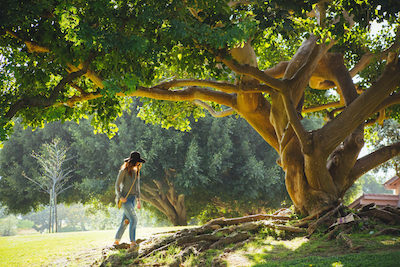Given the choice, would you rather live in an energy hog of a dorm with poor ventilation and very little natural light or a dorm that saves energy with a green roof and water-efficient toilets and faucets?

Even if you don't fancy yourself an environmentalist, it's important to recognize that the programs and policies a school adopts can greatly impact your quality of life (not to mention the future of the planet). When decision makers spend the time and effort to employ healthy and efficient practices, they are displaying responsibility and respect for the campus community.
Here are three perks that a sustainable campus has to offer.
1. Dorms and academic buildings with clean air and natural light
Green colleges make a point to account for sustainable living when designing and operating their buildings. Many of their facilities incorporate natural lighting, improve air quality, and reduce energy and water use. On many campuses green or “living” roofs absorb rainwater and provide insulation while lights on timers save schools money as well as energy. Real-time energy reporting allows you to easily see the building's hour-by-hour solar electricity production as well as electricity and water consumption. In turn, these attributes foster more welcoming academic and social communities and result in buildings that are better places to live, learn, and play.
2. Plenty of healthy and fresh dining options
Eco-friendly colleges believe that food tastes better when it's local and organic. They forego long distance, low-grade cafeteria food and offer their students fresh and local cuisine, from campus farms or markets, whenever possible. You'll love how sustainable dining often translates to varied nutrition options. Many schools are 100 percent trayless (to reduce water usage, food waste and electricity), compost kitchen food waste (which can be used to fertilize the campus), and utilize biodegradable paper and packaging.
Read More: Top 50 Green Colleges
3. An easy commute to class
Consider how mobility plays into your standard of living. How “walkable” is a particular campus? Is public transportation accessible? Some schools have thriving bike cultures. Others transport riders via campus shuttle, or offer a myriad of other transportation options, from free bus passes to car-share programs. You'll definitely appreciate the freedom these choices afford, all while lessening your environmental impact.
Looking for strategic college advice?
Get one-on-one help from former Ivy League and top tier admission officers. Our College Admission Counselors will help you find, apply, and get accepted to your dream school.
Explore Colleges For You
Connect with our featured colleges to find schools that both match your interests and are looking for students like you.
Get Started on Athletic Scholarships & Recruiting!
Join athletes who were discovered, recruited & often received scholarships after connecting with NCSA's 42,000 strong network of coaches.
Best 389 Colleges
165,000 students rate everything from their professors to their campus social scene.







